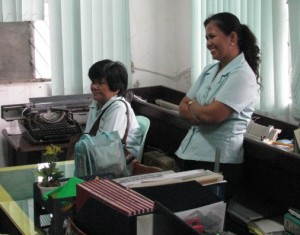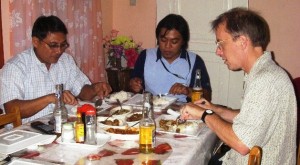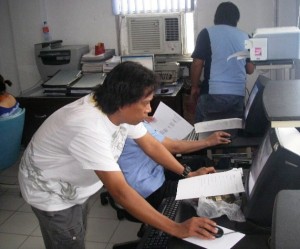From a global perspective, the Philippines is seriously lacking in financial resources.Of course this presents a major challenge to project delivery.Yet, increasingly I’m appreciating other ways, beyond the allocation of more funds, which contribute to project success. As I see it in practice, here in the Philippines, at the heart of those other ways are a focus on traditions, workplace relations, and collaborative approaches.
As context for my observations…. I’m now into my 6th and final week, here in the Philippines, with the Canadian Executive Service Organization (CESO), working as a Volunteer Advisor to the e-Governance for Municipal Development (eGov4MD) project.The eGov4MD project is an international collaborative, orchestrated by the League of Municipalities of the Philippines (LMP), bringing together various Filipino organizations, municipalities, and foreign nonprofits (e.g., CESO).
So here’s my list for how the eGov4MD collaborative project approach, combined with Filipino traditions and ways of interacting, brings project success, even when the financial resources are lacking!
Traditions
1.Food. Eating together helps build and solidify relationships; and is very much part of the Filipino way of doing business.
2.Family. Family is central to the Filipino way of living. The influence of family values (e.g., caring for the other) extends to the workplace.
3.Ceremony. Municipal offices typically start each week with routine; e.g., flag raising, anthems, announcements. This ritual confirms place (in the bigger scheme of things), and presents an opportunity to share information.
4.Dress. Basic, sensible dress standards, adopted by all levels of the organization, provide a further sense of surety and belonging in the workplace.
Workplace relations
5.Respect and humour.These are Filipino attributes which seem to be in limitless supply, and both of which are intrinsic to a positive team environment.
6.Diversity.Filipinos seem to be accepting of differences in people; e.g., physical appearance, social status, sexual orientation, religion.
7.Inclusion. Providing opportunity for less-fortunate citizens; e.g., for street vendors to sell their produce within the Municipal building = a form of corporate responsibility!?
8.Accessibility.In the Municipalities I’ve worked, citizens have direct access to real people (as opposed to automated answering machine), in positions of authority (including the Mayor).
9.Openness.Working in close physical proximity to others, often with little personal privacy, seems (to me) to contribute to a collegial, authentic workplace.
10.Sharing.The lack of material resources necessitates sharing; e.g., of offices, desks, computers, cars (if you’re a driver for Municipality!).
11.Dealing with uncertainty.The power may go off at any time. Will I still have a job when the new Mayor takes office? Floods and erupting volcanoes.Uncertainty is ever present Filipinos are skilled in working together in time of uncertainty.

Treasury staff in Botolan; in good humour, even in times of uncertainty after the flood. Photo by Mark Nery.
Project Approach
12.Central stewardship. The LMP office in metro Manila provides overall stewardship and coordination of the eGov4MD projects.
13.Creative Funding Partnerships. Municipalities, NGOs, central government agencies, and international partners all contribute their share of resources to make it work.
14.Innovative staffing. Public, private and volunteer professionals, local and international, all work together on the same project team.
15.Central development. Computerized business applications are developed by a national agency, and made available to local municipalities, for implementation.
16.Local implementation. Local Municipalities have some flexibility in how they implement the applications, based on their unique municipal circumstances. They also develop additional applications, as their capacities permit.
17.Personal initiative. Motivated staff are given the opportunity and encouragement to develop their abilities and contribute.
18.Leverage power. Acknowledging that Municipal mayor and elected officials have significant authority and influence over potential outcomes, they are incorporated into key decision points in the project workflow.
19.Ownership and responsibility. In addition to taking ownership of the (computer applications) products implemented in their Municipality, Municipalities are also developing the capacities to develop and support their own products, and provide services (e.g., product experts) to other municipalities.
20.Alternative business models. One thing the lack of money does is force one to look at new ways of doing business; i.e., lower-cost options that still provide value. In the case of eGov4MD this includes the role of professional volunteers, and using open source technologies. I’ve also seen this in other areas of Municipalities I’ve visited e.g., almost total reliance on midwives and home-based childbirth vs. Hospital delivery (more expensive).
21.Open source technologies. The eGov4MD technology platform is based on open-source, non-proprietary software and solutions; thereby reducing reliance on for-profit software vendors, and maintaining organizational autonomy.
22.Communities of Practice. The eGov4MD project is implicitly using a Community of Practice approach when it advocates groups of people (e.g., eGov4MD technical staff), with common concerns, to deepen their knowledge and expertise in their area by interacting on an ongoing basis (seemy post about the power of Communities of Practice).
23.Knowledge transfer. If Communities of Practice put collaboration into practice, then knowledge transfer is one of the key principles behind establishing Communities of Practice.
24.Online communities. Internet and cloud computing options increasingly provide affordable ways to connect and interact with others, locally and abroad.
25.Questions. Project team members are willing to ask others, especially in neighbour municipalities, who have implemented a similar project….how are you doing this…?; thereby gaining strength from the group, and reducing reliance on self.
26.Staff development. Updating individual skills is used as a way to build long-term individual and organizational (Municipality) capacities.
27.Organization development. Establishing Information & Communications Technology (ICT) Units to plan and manage future ICT growth.
What’s your experience on successful collaboratives, where financial resources were few? What would you add to this list?
If you enjoyed this post, I would appreciate if you left a comment or subscribed to my blog. Your feedback helps me make this blog more interesting and relevant. Thanks, Ben.



As a VA of 10 years, with 8 international assignments under my belt, it was so nice to read you blog and be reinforced with the fact that we do make a difference. Your work there looks really interesting and will no doubt make a very significant difference to the country. Well done!
Blair… thanks. I agree, and think that what we do individually (e.g., via CESO) makes a positive difference; even if only a little one.
Ben
It is very nice to notice that you support taking the open source approach to build a better eworld for municipalities in the Philipinos Islands. Such an approach should be an exemple for our own Canadian municipalities spending lots of resources on proprietary software while cutting direct services to citizens. Canadian municipalities should follow your approach. Keep the good work.
Simon
Hi, Ben. Excellent work. As a VA who had the opportunity for a two month assignment in the Philippines, I came across a good cross-section of the people from – the affluent to the lower ranks lacking resources. In all levels I found the Filipinos to be very friendly, family oriented, intelligent and happy, especially the younger generation. They deserve all the assistance they can get
and CESO is making a world of difference there.
Simon.. Thanks for the feedback. Nice to hear your thoughts echo mine. We here in Canada have much to learn about other ways of governance.
Chris… thanks for sharing your experiences. I too found Filipinos to have all the attributes you mention, and when you say they ‘deserve’ CESO’s (positive) assistance – it makes me reflect on the strong relationship that Canada and the Philippines have together. It surprises and amazes me how much the two countries and peoples have in common.
Hi Ben.
Having been on 3 assignments to the Philippines (south, mid and north) I find your observations about the Philippines right on. I do believe we as CESO volunters do leave positive impressions,assisting the people we have worked with, in coping better with the future.
Thanks Soren for your comment. It’s encouraging for me to know we’re on the same page.
Hi Ben,
Congratulations for your nice job in the Philippines. I have been for 21 months CESO Country Representative in Benin and was impressive what your colleagues VA accomplished with the support of the administrative teams in Toronto and Montreal. If in Benin within 21 months time 38 assignments have been accomplished and 16 have been cancelled, it is obvious that CESO is very useful for our developing countries. Even one of the CESO customers in Benin stopped with all the other volunteer adviser programs and adopted CESO for the deep and wide experience of the VAs. So go ahead Ben !
Pierre DOVONOU LOKOSSOU
Former CESO CR/Benin
00 (229) 90 91 2001
Pierre,
It is so nice to connect with you. Sounds like you are doing some fine work in Benin. I’d love to hear more about ways the CESO/Benin collaboration is working. Maybe you can create a list like this one I did on collaborative projects in the Philippines; except orient it to the Benin context? I’d be happy to share your insights on my blog! Take care. And, merci beaucoup pour tout votre travail (I know, my French is poor!).
Ben, nice to hear from you so quickly. Your French is not so poor. Since CESO is no longer working with Benin, I cannot share with you update information about the ways CESO/Benin collaborative is working. But as I still have in my heart the large CESO family, you can contact me if you want the slightest piece of information about Benin or if a friend of yours is coming down here.
Pierre DOVONOU
Pierre, whoops! I didn’t realize CESO was no longer working in Benin. I should be more on top of things. Still, nice to know you still feel part of the broader CESO community. And, yes if I or friend intent to visit, we shall be in touch. All the best. Ben